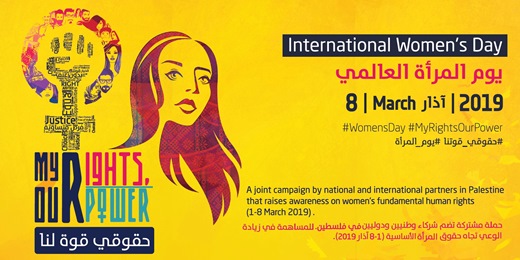International Women’s Day 2005
Today, on the occasion of International Women’s Day, 11 UN agencies[1] operating in the occupied Palestinian territory have put their voices together in a call to action for the protection of Palestinian women from the political, economic and social insecurity that threatens their wellbeing.
“In Beijing, the nations of the world recognized that gender equality, peace and development are inexorably linked, but ten years later, it is still a Palestinian woman’s face that we see in this conflict when we speak of suffering from poverty, social upheaval and violence.” says Alia El-Yassir, UNIFEM Programme Coordinator.
- Women in the occupied Palestinian territory face particular challenges due both to the ongoing conflict situation coupled with internal constraints, including:
- Poverty: As a result of growing unemployment, declining incomes, loss of property due to house demolitions, land requisitions and levelling, the number of poor people has reached more than 2.2 million. Approximately 11% of the affected households, which are living on less than $2 per day, are female-headed households, which studies show are suffering more acutely from the continuing cycle of poverty and vulnerability.
- Low political participation: Less than 6% of PLC members are women and there are only 2 women in the new Palestinian cabinet. Palestinian Authority institutions have a representation of only 13% women, which decreases to below 1% at the local government level. Women account for just over 10% of lawyers and less than 9% of judges
- School drop-out: Early marriage contributes to 46% of the drop-out rate for female students, particularly at the secondary level, due to the limitation of compulsory education and the worsening economic situation.
- Food insecurity: 368,480 non-refugee Palestinian women are food aid dependent, constituting 49% of the total number of non-refugee beneficiaries in oPt.
- Lack of access to reproductive health services: 31% of pregnant women are anaemic. Home deliveries increased from 5.2% (2000) to over 30% (2003); 61 women delivered at checkpoints between September 2000 and October 2004, out of which 36 were stillbirths.
- Low participation in formal labour force: 82.7 % of women in the West Bank and 90.5% of women in the Gaza Strip are outside the labour force, reflecting a heavy burden of care, a large portion of unpaid work, low levels of qualification and limited job opportunities that are clustered in a small number of occupations. About 25% of working women from refugee camps in oPt are employed in elementary occupations, which are low-paid and irregular.
- The Barrier: If construction of the Barrier continues as planned, an estimated 50,000 Palestinians in the area between the Barrier and the Green Line would be adversely affected by loss of work, limited freedom of movement resulting in limited access to health and education services, migration and psychosocial burdens. Women would suffer the impact more deeply due to social fragmentation and loss of personal freedoms.
The UN agencies call upon:
- Israeli authorities to ensure the protection and safety of Palestinian women as well as their unconditional access to crucial services in health, nutrition, education and employment.
- the Palestinian Authority to provide legislation that ensures formal and substantive equality and equity between men and women in respect to all their human rights, in line with the Convention on the Elimination of All Forms of Discrimination Against Women. (CEDAW)
- the international community to ensure that all parties to the conflict respect human rights laws and principles and abide by International Humanitarian Law regarding the protection of civilians, including women; and that an environment be created that is conducive of Palestinian reform and institution-building processes that are based on gender equality and equity standards.
Read More...
By: UN Women
Date: 09/03/2019
By: Dr. Riyad Mansour
Date: 08/11/2017
By: Palestinian Women Coalition of UNSCR 1325
Date: 20/10/2016
By the Same Author
Date: 08/06/2004
Date: 07/06/2004
Date: 29/03/2004





